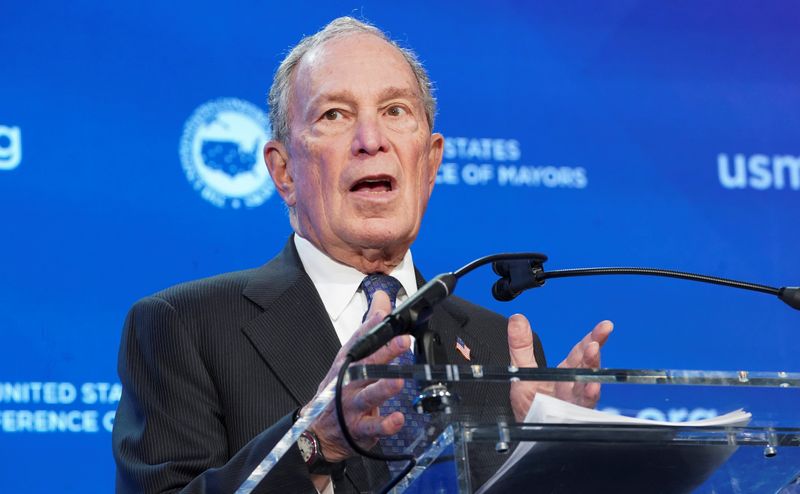By Jason Lange
WASHINGTON (Reuters) - U.S. democratic presidential candidate Michael Bloomberg on Saturday proposed major tax hikes on wealthy Americans and corporations, including a new tax aimed at people earning more than $5 million per year.
Bloomberg's campaign estimates the measures will raise about $5 trillion over ten years.
All major Democratic candidates have called for higher taxes on the rich and Bloomberg's plan helps situate the billionaire former mayor of New York as a relative moderate among Democrats hoping to challenge Republican Donald Trump in the November election.
The proposals bear similarities with those of moderate frontrunner Joe Biden.
Like Biden, Bloomberg advocates rolling back tax cuts for well-off Americans enacted under Trump, as well as charging higher tax rates on profits earned by the wealthy on asset sales. Also like Biden, he wants to raise the corporate tax rate to 28% from 21%.
But Bloomberg also aims squarely at the incomes of hyper-rich individuals like himself, with an approach similar in spirit to new wealth taxes proposed by progressive frontrunners Bernie Sanders and Elizabeth Warren.
Bloomberg made his estimated $60 billion fortune selling financial information to Wall Street. When it comes to taxing the super rich, his approach differs from Sanders and Warren in that it would tax income rather than assets.
While Sanders proposes new taxes on the wealth of the richest 0.1% of America, Bloomberg would put a 5% surtax on annual incomes above $5 million, hitting a similarly narrow 0.1% of U.S. taxpayers.
Tax experts have warned that taxing wealth - rather than income - might get bogged down in legal challenges. Bloomberg's campaign agrees. "Most importantly, my plan is achievable," the candidate said in a statement.
The campaign did not provide estimates on how much revenue each policy was expected to bring in. A policy advisor said some of the heaviest lifting would be done by higher corporate taxes and by taxing profits on asset sales - known as capital gains - at the same rate as normal income when a taxpayer earns more than $1 million a year.
Bloomberg's campaign says the plan would help fight economic inequality and pay for the candidate's major spending proposals, which include expanding health insurance coverage and repairing roads and bridges.
"Those investments require new revenue - and a fairer, more progressive tax system that asks wealthy Americans like me to pay more," Bloomberg said.
Economic inequality is much higher in America than in most other developed countries. The top 1% of U.S. households owned more than 40% of the nation's wealth in 2016, more than twice the share owned by Canada's top 1%, according to the Organisation for Economic Co-operation and Development.

Bloomberg also proposed making more estates subject to taxes when they are inherited and closing tax loopholes for income and inherited wealth.